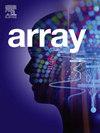Beyond raw data: AI-driven biosensor fusion for enhancing athletic performance
IF 4.5
Q2 COMPUTER SCIENCE, THEORY & METHODS
引用次数: 0
Abstract
We have all heard a lot about the potential of data enabled by artificial intelligence (AI) to improve performance. This progress has seen the steady advancements of wearable biosensors capable of generating live data and feedback on an athlete's physiological state, allowing for smarter training and enabling consistent performance improvement. However, wearable biosensors often struggle with noise and signal interference caused by various factors, including muscle movements, sweat, and environmental conditions. This study proposes the Smart Performance Analysis and Real-time Tracking Algorithm (SPARTA) for enhancing athletic performance using AI techniques. SPARTA leverages AI algorithms to analyze real-time physiological data - including heart rate, oxygen saturation, skin conductance, and cortisol levels - enabling dynamic adjustments to training loads and recovery protocols. Experimental evaluations using the Biosensor-Student Health Fitness Dataset (n = 500 input samples) demonstrated SPARTA’ s capability to achieve 91.34 % accuracy in SpO2 monitoring, 88.72 % precision in skin conductance detection, 82.64 % correlation with laboratory assays for sweat electrolyte analysis, and 78.65 % accuracy in non-invasive cortisol level tracking. With more advances in artificial intelligence, wearable biosensors will greatly help boost athletic performance, further dominating the sports & fitness globe.
原始数据之外:人工智能驱动的生物传感器融合,以提高运动员的表现
我们都听说过很多关于人工智能(AI)支持的数据在提高性能方面的潜力。这一进展见证了可穿戴生物传感器的稳步发展,该传感器能够生成运动员生理状态的实时数据和反馈,从而实现更智能的训练,并实现持续的成绩提高。然而,可穿戴生物传感器经常与各种因素引起的噪音和信号干扰作斗争,包括肌肉运动、汗水和环境条件。本研究提出了智能性能分析和实时跟踪算法(SPARTA),用于使用人工智能技术提高运动成绩。SPARTA利用人工智能算法分析实时生理数据,包括心率、氧饱和度、皮肤电导和皮质醇水平,从而能够动态调整训练负荷和恢复方案。使用生物传感器-学生健康健身数据集(n = 500个输入样本)进行的实验评估表明,SPARTA能够在SpO2监测中达到91.34%的准确率,在皮肤电导检测中达到88.72%的准确率,在汗液电解质分析中与实验室分析的相关性为82.64%,在非侵入性皮质醇水平跟踪中达到78.65%的准确率。随着人工智能的进一步发展,可穿戴生物传感器将极大地帮助提高运动员的成绩,进一步主导体育运动。全球健康。
本文章由计算机程序翻译,如有差异,请以英文原文为准。
求助全文
约1分钟内获得全文
求助全文

 求助内容:
求助内容: 应助结果提醒方式:
应助结果提醒方式:


